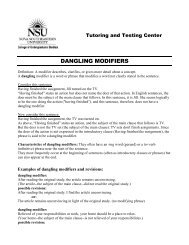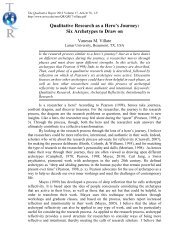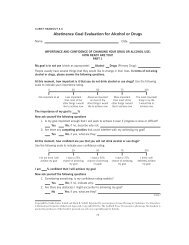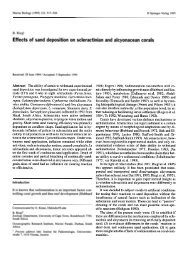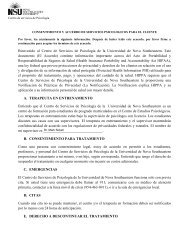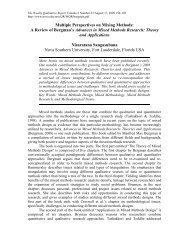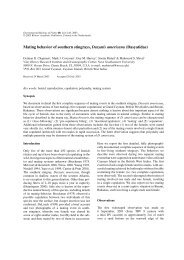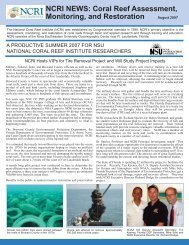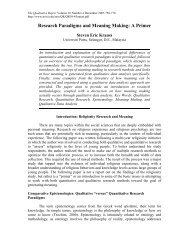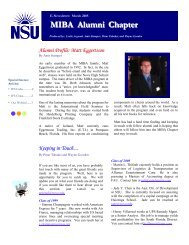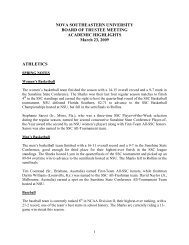Contextualizing Theories and Practices of Bricolage Research
Contextualizing Theories and Practices of Bricolage Research
Contextualizing Theories and Practices of Bricolage Research
You also want an ePaper? Increase the reach of your titles
YUMPU automatically turns print PDFs into web optimized ePapers that Google loves.
Matt Rogers 3<br />
In societies adopting mythical rationalities, Levi-Strauss explains, meaning-making<br />
processes mirror a bricolage process. Like an “intellectual bricolage,” he explains,<br />
mythical-knowers piece together their life-history with artifacts (e.g., texts, discourses,<br />
social practices) <strong>of</strong> their given cultural context to construct meaning. In this way,<br />
mythical meaning-making contrasts a scientific meaning-making process; the latter more<br />
mirrors the stricter approaches taken up by engineers. Meaning-making bricoleurs<br />
(inversely to engineers) do not approach knowledge-production activities with concrete<br />
plans, methods, tools, or checklists <strong>of</strong> criterion. Rather, their processes are much more<br />
flexible, fluid, <strong>and</strong> open-ended. As Levi-Strauss explains, a meaning-making bricoleur is<br />
“adept at performing a large number <strong>of</strong> diverse tasks; but, unlike the engineer, he (sic)<br />
does not subordinate each <strong>of</strong> them to the availability <strong>of</strong> raw materials <strong>and</strong> tools conceived<br />
<strong>and</strong> procured for the purpose <strong>of</strong> the project” (p. 17). For Levi-Strauss, mythical meaningmaking<br />
bricoleurs combine their imagination with whatever knowledge tools they have<br />
at-h<strong>and</strong> in their repertoire (e.g., ritual, observation, social practices) <strong>and</strong> with whatever<br />
artifacts are available in their given context (i.e., discourses, institutions, <strong>and</strong> dominant<br />
knowledges) to meet diverse knowledge-production tasks.<br />
While Levi-Strauss’s use <strong>of</strong> the bricolage metaphor was part <strong>of</strong> a structuralist<br />
project, his articulation has been influential beyond structuralist circles. As I continue, I<br />
show how the metaphor has moved away from structuralism to be adopted by poststructuralist<br />
researchers <strong>and</strong> scholars. In this new context, bricolage becomes an approach<br />
to meaning-making that challenges the basis <strong>of</strong> structural rationality. Specifically, it<br />
challenges the epistemological <strong>and</strong> ontological assumptions that the world has universal<br />
structures that exist independently <strong>of</strong> human rationalities. However, in my discussions <strong>of</strong><br />
this move, I pay close attention to how bricolage as a form <strong>of</strong> inquiry has continued to be<br />
influenced by Levi-Stauss’s use <strong>of</strong> the metaphor.<br />
Norman Denzin <strong>and</strong> Yvonna Lincoln: The Qualitative <strong>Research</strong>er as a Bricoleur<br />
In the introductory chapter <strong>of</strong> the SAGE H<strong>and</strong>book <strong>of</strong> Qualitative <strong>Research</strong>,<br />
Norman Denzin <strong>and</strong> Yvonna Lincoln (1999) borrow Levi-Strauss’s bricolage metaphor to<br />
describe trends emerging in qualitative research. Using the metaphor they describe how<br />
post-colonial (Smith, 1999) <strong>and</strong> post-positivist/post-modernist/post-structuralist<br />
paradigms (Butler, 1990; Giroux, 1981; Guba, 1990; Lather, 1991) have driven<br />
researchers to develop eclectic multi-theoretical <strong>and</strong> multi-methodological approaches to<br />
meaning-making in research. In this section, I contextualize their use <strong>of</strong> the metaphor <strong>and</strong><br />
explain its meaning <strong>and</strong> implications for qualitative research.<br />
Denzin <strong>and</strong> Lincoln’s chapter has two major elements: first, it defines qualitative<br />
research; <strong>and</strong>, second, it sketches a timeline <strong>of</strong> historical moments that influenced<br />
researchers throughout the 20th century. The bricolage metaphor surfaces in the latter <strong>of</strong><br />
these two tasks where, focused on North America, the scholars chronicle eras <strong>of</strong><br />
qualitative research from the 1900’s until present day. Their account tracks significant<br />
ruptures in epistemological, ontological, ethical, <strong>and</strong> political underpinnings that<br />
influenced researchers at particular times. Their record shows that, while traditional<br />
qualitative research was based on positivist rationalities, successive generations adopted<br />
more interpretive, post-positivist, post-colonial, post-modern, constructivist, <strong>and</strong> poststructuralist<br />
approaches. For Denzin <strong>and</strong> Lincoln, these shifts to “post” discourses drove



